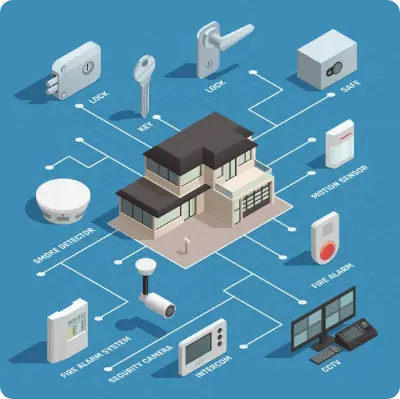Imagine a bustling factory floor humming with activity. Now, picture your home network where you connect to the internet. Though both rely on routers, the needs and functionalities are vastly different. This blog delves into the key distinctions between industrial and home routers, helping you understand which one suits your specific needs.
1. Functionality of Routers:
At their core, both routers share the same responsibility: directing data packets across a network and connecting devices to the internet. However, the complexity and demands differ significantly.
2. Industrial Routers: A Deep Dive:
Industrial routers are built for durability and reliability in harsh environments. They often operate in extreme temperatures, dusty conditions, and near heavy machinery, making robust hardware essential. Here’s what sets them apart:
- High Performance: Industrial routers handle heavy data loads with minimal latency (delay) – crucial for real-time applications like factory automation and industrial control systems. According to a 2023 study by ARC Advisory Group, 72% of industrial manufacturers prioritize real-time data transfer for optimal production efficiency.
- Advanced Security Features: Industrial environments are prime targets for cyberattacks. These routers boast robust firewalls, intrusion detection systems, and encryption to safeguard sensitive data and prevent operational disruptions.
- Wide Range of Connectivity Options: They support various industrial communication protocols like Modbus and Profinet, enabling seamless integration with diverse equipment and sensors.
3. Home Routers: Unveiling the Essentials:
Home routers prioritize affordability and user-friendliness. They cater to a smaller number of devices, typically focusing on internet browsing, streaming, and basic networking tasks. Here are their key characteristics:
- Basic Functionality: They offer adequate performance for everyday home internet needs, but may struggle under heavy data loads.
- Limited Security Features: While offering basic firewall protection, they may lack advanced security features like intrusion detection or VPN support.
- Focus on Wireless Connectivity: Home routers prioritize Wi-Fi coverage and user-friendly interfaces for easy setup and management.
4. Performance Metrics Comparison:
Let’s delve deeper into two crucial performance metrics:
5.1. Bandwidth Capabilities:
- Industrial Routers: Handle high bandwidths (data transfer rates) to support numerous connected devices and large data transfers. Imagine a factory with hundreds of sensors sending data; an industrial router ensures smooth communication without bottlenecks.
- Home Routers: Offer adequate bandwidth for typical home use, but may struggle with simultaneous high-bandwidth activities like video conferencing and online gaming.
5.2. Latency and Reliability:
- Industrial Routers: Prioritize low latency (minimal delay) for real-time applications. Even a slight delay in critical industrial processes can have significant consequences.
- Home Routers: Latency is not a primary concern for most home users. However, gamers and those relying on real-time communication may experience occasional lag or buffering.
6. Scalability and Adaptability:
- Industrial Routers: Often modular and scalable, allowing businesses to add features and capacity as their needs evolve. This is crucial for future-proofing critical industrial networks.
- Home Routers: Typically offer limited scalability. Upgrading to a more powerful router might be necessary as network demands increase.
7. Security Measures: A Head-to-Head Analysis:
Security is paramount, especially for industrial networks. Let’s compare key security features:
7.1. Firewall Protection: Both offer basic firewall protection, but industrial routers may have advanced features like deep packet inspection and stateful firewalls for granular control.
7.2. Threat Monitoring and Anomaly Detection: Industrial routers often have built-in intrusion detection systems (IDS) and intrusion prevention systems (IPS) to proactively identify and prevent threats.
7.3. Encryption and VPN: Both can support encryption for secure data transmission. Additionally, industrial routers often offer VPN functionalities for secure remote access to critical systems.
7.4. Segmentation Capabilities: Industrial routers can segment networks creating isolated zones for different devices or functions, minimizing the impact of a security breach in one zone.
7.5. Authentication and Access Controls: Industrial routers offer robust user authentication and access control features to restrict access to specific network resources.
7.6. Secure Remote Access: Secure remote access is crucial for industrial troubleshooting and maintenance. Industrial routers often provide various secure remote access options like SSH or VPN.
Industrial vs. Home Routers: A Quick Stats Summary
| Feature | Industrial Router | Home Router |
| Target Audience | Industrial environments (factories, power plants) | Homes |
| Uptime Priority | Very high (critical business operations) | Moderate (daily internet usage) |
| Security Focus | Advanced firewalls, intrusion detection, VPNs | Basic firewalls, WPA encryption |
| Scalability | Highly scalable for future growth | Limited scalability |
| Bandwidth | 100 Mbps – 10 Gbps+ | Up to 300 Mbps |
| Latency | Low latency for real-time communication | Moderate latency, may fluctuate |
| Cost | Higher upfront cost, lower lifecycle cost (reliable) | Lower upfront cost, higher potential downtime cost |
| Customization | Highly customizable for specific needs | Limited customization options |
Ensuring Uninterrupted Performance and Robust Security for Your Industrial Network
Equipping your industrial operation with the right router is crucial for maintaining seamless connectivity, safeguarding sensitive data, and optimizing overall performance.
HashStudioz Technologies is your one-stop shop for industrial router solutions. Our team of experts can help you assess your specific needs, recommend the ideal router for your environment, and ensure seamless integration with your existing infrastructure.
Contact HashStudioz Technologies today to explore our comprehensive industrial router solutions and experience the difference reliable connectivity can make for your operations.



